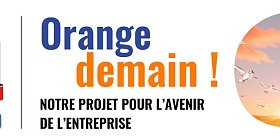Avis de gros temps sur la stratégie 2020-2025 du Groupe Orange
Rédigé par Thierry Meurgues le . Publié dans Comité Groupe Europe+Monde.
[French version here/English version below]
Dans le cadre du Comité Groupe Monde des 25, 26 et 27 mai 2021 (réunion en distanciel), la Direction du Groupe a inscrit à l'ordre du jour un point de suivi de la stratégie 2025, dossier présenté par Agnès de Leersnyder, Directrice de la stratégie du Groupe Orange, et Benoît Dussert, Senior VP plan stratégique et évaluation.
A la demande du Bureau du Comité de Groupe Monde, relayant un souhait de ses membres, la Direction du Groupe a présenté un point d'étape de la stratégie 2020-2025, plan présenté dans ses grands axes par Stéphane Richard, Président Directeur Général du Groupe, lors de la séance plénière extraordinaire de ce même Comité de Groupe Monde le 22 janvier 2020 à Paris.
Au-delà du constat que certaines étapes clés du plan Engage 2025 se sont concrétisées, via notamment le partage et la valorisation d'infrastructures et la croissance enregistrée sur la zone Afrique et Moyen Orient, la réalisation de ce plan demeure sous forte pression sur plusieurs des géographies du Groupe, en particulier en France et en Espagne. Certes, la crise sanitaire à confirmé les fondamentaux de cette stratégie, en mettant l'accent sur l'importance des réseaux résilients et sécurisés, l'importance des enjeux autour de la souveraineté et sociétaux par l'inclusion numérique. Mais cette même crise a conduit le Groupe, selon la Direction, à ajuster certains éléments de la stratégie, en particulier dans le domaine des ressources humaines avec de nouveaux modes d'organisation du travail, le décalage des enchères sur la 5G en France, ou encore sur la connectivité enrichie (HomeLan en Europe, cybersécurité B2C, et le haut-débit en zone Afrique et Moyen-Orient.
Au chapître des étapes clés concrétisées, la Direction met en avant quatre principaux chantiers:
- la réinvention du métier d'opérateur, avec l'accélération du déploiement des réseaux fibre et mobile au profit d'une meilleur connectivité, la valorisation et le partage des infrastructures dans le fixe et le mobile, notamment via la création d'Orange Concessions et le projet de TowerCo européenne (Totem), en cours de processus d'information-consultation au sein du Comité de Groupe Européen.
- l'accélération sur les territoires porteurs de croissance, avec une croissance soutenue et d'excellentes performances enregistrées en zone Afrique Moyen-Orient, ainsi qu'une croissance des services IT&IS sur le périmètre d'Orange Business Services.
- la position centrale de la Data et de l'IA au sein du modèle d'innovation du Groupe, avec une réinvention de l'expérience client afin d'améliorer la personnalisation, la sécurité et le soutien, tout en permettant l'optimisation de la gestion des réseaux, l'efficacité opérationnelle et le développement de nouveaux services.
- l'engagement durable au bénéfice de l'environnement et de l'inclusion numérique, avec des premières concrétisations environnementales (-30% de baisse des émissions de CO2 à l'horizon 2025, l'augmentation de l'utilisation d'énergies d'origine renouvelable (fermes solaires en Jordanie, garantie d'origine en Slovaquie), ainsi que la couverture rurale en zone Afrique et Moyen-Orient, la formation et le coaching via 16 fondations locales et l'ouverture des Orange Digital Center (ODC) au Cameroun et en Ethiopie.
Néanmoins, les nuages s'amoncellent au-dessus de la réalisation de ce plan, au premier rang desquels la France et l'Espagne.
- En France, si les perspectives de sortie de crise dépendent de la situation sanitaire, difficilement prévisible par définition, avec un fort impact, entre autres, sur le roaming, la vente d'équipements suite à la fermeture des boutiques, le Groupe doit, selon la Direction, s'adapter à de nouveaux défis tout en poursuivant ses efforts d'investissement dans les infrastructures, le tout dans un cadre réglementaire toujours très contraint.
- En Espagne, le marché a durablement basculé vers le "low-cost" convergent et a été, lui aussi, fortement impacté par la crise sanitaire. Les effets de ce basculement vers le "low-cost" ont encore été amplifiés par une prolifération des marques de niche, contribuant ainsi à augmenter encore la pression. Par ailleurs, un fort ralentissement économique dû à la crise sanitaire a contribué à ralentir substantiellement la demande client. Les prévisions de chiffre d'affaire moyen par client (ARPU) chutent de 10 points enrre 2020 et 2024.
Cette session annuelle 2021 du Comité de Groupe Monde restera empreinte d'interrogations fortes de ses membres, représentant les quelques 143 000 salariés du Groupe Orange dans le monde, en particulier sur le sentiment profond, déjà vérifié à plusieurs reprises dans les faits depuis le début de l'année, qu'ils seront les premières victimes d'une stratégie de plus en plus erratique et particulièrement mortifère dans le domaine des ressources humaines, avec 70 suppressions d'emplois au Royaume-Uni initiées en janvier, 485 en Espagne représentant 15% des effectifs, 172 en République Démocratique du Congo, et sans doute d'autres encore que l'on ne découvrira, comme à l'accoutumée et faute de concertations préalables, dans les articles de la presse économique.
La seule réponse de la Direction se concrétise au travers du programme ScaleUp visant à économiser 1 million d'euros par jour (1 milliard d'euros sur 3 ans), alors qu'elle prône dans le même temps l'austérité salariale à tous les étages du Groupe, sauf bien entendu à celui des cadres dirigeants, lesquels bénéficient d'une large et généreuse distribution d'actions gratuites (programme LTIP - Long Term Incentive Plan) d'une valeur oscillant entre 20 et 25 millions d'euros.
L'ensemble du Comité de Groupe Monde a solennellement montré son indéfectible solidarité à leurs collègues victimes de suppression de leur poste au travers d'une déclaration prélable lue en début de séance, mais en l'absence, devenue habituelle, du Président de l'instance par délégation, Gervais Pellissier, Directeur Exécutif des Ressources Humaines du Groupe, remplacé par Eric Bousquet, Directeur des Relations Sociales du Groupe.
Orange, certes entreprise digitale, est-elle encore humaine ?
[English version]
As part of the World Works Council on May 25th, 26th and 27th, 2021 (remote meeting), the Group Management included on the agenda a follow-up point for the 2025 strategy, a file presented by Agnès de Leersnyder, Director of the Orange Group strategy, and Benoît Dussert, Senior VP strategic plan and evaluation.
At the request of the Bureau of the World Works Council, relaying a wish of its members, the Group Management presented a progress report on the 2020-2025 strategy, a plan presented in its main axes by Stéphane Richard, Chairman and CEO of the Group, during the extraordinary plenary meeting of this same World Works Council on January 22nd, 2020 in Paris.
Beyond the observation that certain key stages of the Engage 2025 plan have materialized, notably via the sharing and development of infrastructures and the growth recorded in the Africa and Middle East zone, the implementation of this plan remains under strong pressure on several the Group's geographies, in particular in France and Spain. Of course, the health crisis has confirmed the fundamentals of this strategy, emphasizing the importance of resilient and secure networks, the importance of issues around sovereignty and societal issues through digital inclusion. But this same crisis has led the Group, according to Management, to adjust certain elements of the strategy, in particular in the field of human resources with new modes of work organization, the delay of auctions on 5G in France, or further on enriched connectivity (HomeLan in Europe, B2C cybersecurity, and broadband in Africa and the Middle East.
In the chapter of the key stages concretized, the Management puts forward four main projects:
- the reinvention of the operator profession, with the acceleration of the deployment of fiber and mobile networks for the benefit of better connectivity, the enhancement and sharing of fixed and mobile infrastructures, in particular through the creation of Orange Concessions and the European TowerCo project (Totem), currently undergoing an information-consultation process within the European Works Council.
- acceleration in growth regions, with sustained growth and excellent performance recorded in the Africa Middle East zone, as well as growth in IT&IS services within the scope of Orange Business Services.
- the central position of Data and AI within the Group's innovation model, with a reinvention of the customer experience in order to improve personalization, security and support, while allowing the optimization of the network management, operational efficiency and the development of new services.
- sustainable commitment to the benefit of the environment and digital inclusion, with the first environmental achievements (-30% reduction in CO2 emissions by 2025, the increase in the use of energy from renewable origin (solar farms in Jordan, guarantee of origin in Slovakia), as well as rural coverage in Africa and the Middle East, training and coaching via 16 local foundations and the opening of Orange Digital Centers (ODC) in Cameroon and Ethiopia.
Nevertheless, the clouds are gathering above the realization of this plan, foremost among which are France and Spain.
- In France, if the outlook for a way out of the crisis depends on the health situation, which is difficult to predict by definition, with a strong impact, among other things, on roaming and the sale of equipment following the closure of stores, the Group must, according to Management, adapt to new challenges while pursuing its efforts to invest in infrastructure, all within a regulatory framework that is still very tight.
- In Spain, the market has permanently shifted towards converging "low-cost" and has also been strongly impacted by the health crisis. The effects of this shift towards "low-cost" have been further amplified by a proliferation of niche brands, thus contributing to further increase the pressure. In addition, a strong economic slowdown due to the health crisis has contributed to a substantial slowdown in customer demand. The forecast for average revenue per customer (ARPU) drops by 10 points between 2020 and 2024.
This 2021 annual meeting of the World Works Council will remain marked by strong questions from its members, representing some 143,000 employees of the Orange Group around the world, in particular on the deep feeling, already verified several times in the facts since the beginning. of the year, that they will be the first victims of an increasingly erratic and particularly deadly strategy in the field of human resources, with 70 job cuts in the United Kingdom initiated in January, 485 in Spain representing 15 % of the workforce, 172 in the Democratic Republic of Congo, and undoubtedly others still that one will not discover, as usual and for lack of preliminary consultations, in the articles of the economic press.
Management's only response is through the ScaleUp program aimed at saving 1 million euros per day (1 billion euros over 3 years), while at the same time it advocates wage austerity for all employees. Group floors, except of course that of senior executives, who benefit from a large and generous distribution of free shares (LTIP program - Long Term Incentive Plan) with a value ranging between 20 and 25 million euros.
The entire World Works Council solemnly showed its unwavering solidarity with their colleagues who were victims of the elimination of their posts through a preliminary declaration read at the start of the meeting, but in the absence, which has become customary, of the President of the authority by delegation, Gervais Pellissier, Executive Director of Group Human Resources, replaced by Eric Bousquet, Director of Group Social Relations.
Orange, certainly a digital company, is it still human?
Emploi & Métiers Europe et International CSEC UES Orange Comité Groupe Europe Comité Groupe France Comité Groupe Monde Orange Cyber Défense OBS SA (UES OBS) Orange Concessions Totem France










